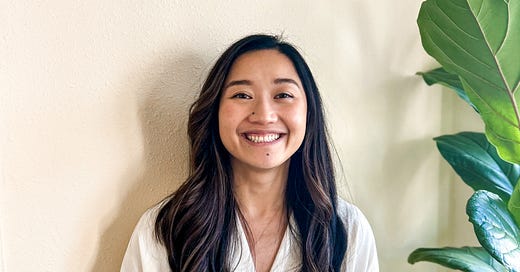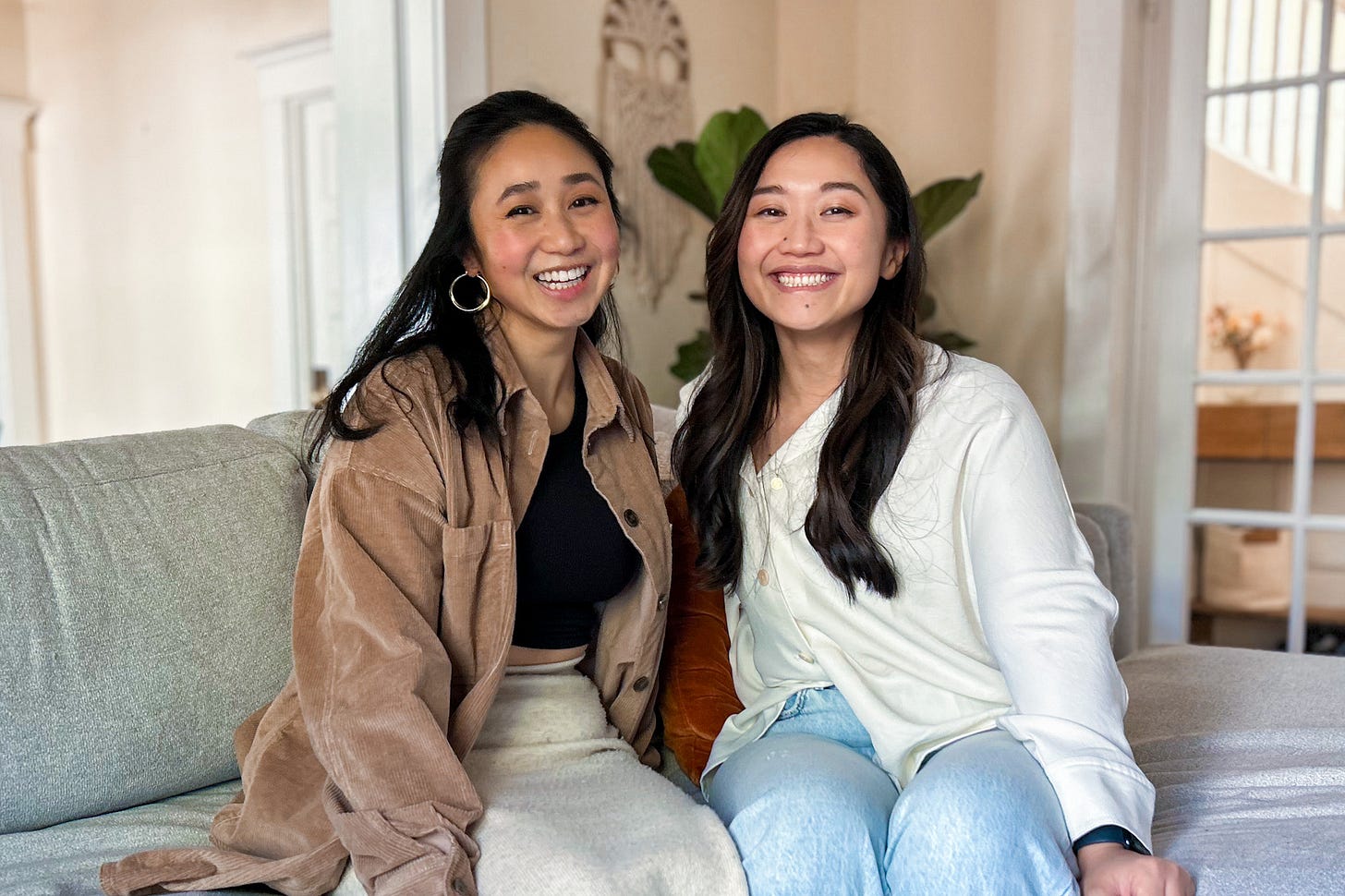Designer spotlight: Lauren Tang, Senior Product Designer at Chime
Lauren and I chat about everything from starting her career as a solo designer, recovering from a layoff, to bringing value to teams through user empathy.
After watering her plants and playing with her cats, Lauren and I chatted for over an hour. We talked about everything from starting her career as a solo designer, recovering from a layoff, to bringing value to teams through user empathy. We covered so much that I’ll be splitting up this interview into two issues. This issue we’ll cover Lauren’s career progression. Look out for another issue this week with some topic deep dives.
Designer profile
Name: Lauren Tang
Role: Senior product designer at Chime
Motivations: personal branding, giving back to the community, spending time with loved ones
Skill to swipe: User empathy
Who are you?
Hi, I'm Lauren. I'm currently living in the Bay Area in Oakland. I work as a senior product designer for Chime, which is the leading digital banking app for 13 million Americans today.
When I'm not designing, I spend my time building my food photography business, I run a food blog called Fitavocado. I do recipe testing, photography, and now video too.
How did you get into design?
My path to design hasn't really been linear.
I've always thought myself to be a creative, but never considered it as an actual career. When I was in college, and I was initially pre-med, I started questioning that. By chance, I took a coding class and that’s when I discovered UX design. Learning that UX was a really cool combination of creativity and problem solving, I felt excited about this being what I wanted to do. I spoke to a friend who had designed at Uber and Dropbox and she gave me some tips on how to break into the industry.
I got really motivated to build my portfolio and right after college, I started working at a travel startup.
What was your first product job like?
When you join a really small company, and mine was so small that I was the sole designer for many years, I was the only one doing the user research, interaction design, and visual design.
You learn that your value is bringing in that user-centered point of view and building that culture. A lot of my time there was spent honing in on my craft, while building that user-centered muscle.
What were your career aspirations then?
A lot of my energy was spent on fine-tuning my craft.
A lot of that was figuring out what’s everyone doing. I was attending a lot of design events, networking events, skillsharing events, so that I wouldn't be siloed as a designer. My aspiration was to make sure that I had the foundational skills, and that I can create effective, visually compelling designs.
I look back on this time fondly, because at a small company, you get the freedom to learn anything and everything.
How did you know when to move on?
I got to this point where I realized I was plateauing.
Even though I loved my coworkers and the culture was good, I worked in the problem space for so long. I was like, okay, I'm ready for a new challenge to solve some new problems and uplevel as a designer.
I was looking for a great mentor and design manager, someone who would be able to see my skills and mentor me to get to the next level. I was also looking for a great culture in the design team. When you’re looking for a new job, it’s really important to ask your future team about what’s the culture like, what do feedback crit sessions look like? Is there safety in getting good feedback from your teammates? Is everyone helping each other?
What happened between then and now?
When I felt like I had hit a wall at the first startup I was working at, that's when I joined another startup in the mobility space, so a different problem space. Instead of being the only designer, it was a much bigger team, where I had peers and a good design manager.
I was okay about the mission, but I was really excited about the team. But I ended up getting laid off. So then, I was searching now for not only a great design team, but a mission that would be more interesting for me long term.
What do you do now?
Right now at Chime, I work on the Move Money team. We design experiences to make sure that moving money at Chime feels easy, seamless, and convenient for our members. Within that, I work on the Transfers team and the Cash & Checks team to make sure that those experiences feel seamless.
What are your career goals now?
I'm really thinking about how I can use my design brand.
As I become more interested in leadership roles, it’s about what my personal design brand looks like on the team and outside of that. What is my design philosophy, design values, and expertise? Then, I need to make sure that my cross functional partners and the design team understand that. That’s when you start building trust.
As an individual contributor, I’ve thought about what I’m doing, but now it’s about what’s that outward way that I can build influence, not just within my work, but how I show up on my team.
Where do you see yourself in a couple years?
I would love to give back a little bit more. The people that I spoke to early on in my career were so influential on me. I’m looking to see how I can do more mentorship and help other designers as well.
I can't say I want to be a design manager until I've tried it, so that’s something that I want to make sure I'm always open. I could also end up hating it and want to be a super IC.
What would you go back and tell your early career self?
Don't focus on what everyone else is doing.
When you're siloed like that, it's easy to compare your work. At the end of the day, you bring a very unique perspective and skill set to whichever team you join. There's really so many different types of designers. The work is so multifaceted, you can be an amazing animator or be great at visioning projects. There’s so many things that can be your superpower. Don't worry about trying to be good at everything, figure out what you're good at. There are endless problems, and endless types of users.
Now that I work at a bigger company with a bigger design team, I’m realizing that you have your team to lean on. It's okay that you're not the best visual designer. There’s other people who are going to help you grow and learn. That’s something that you can all do together.
What has been the proudest moment in your design journey?
What I really feel proud about is to see how far I’ve come.
To have been self-taught, I'm really proud to have carved this career for myself from the get-go. I’m happy with where I'm at today, being a senior designer at Chime and solving problems that feel really challenging to me still, even after three years of being there.
It's been great to think about all those moments that make me the designer I am today. Even things that felt like hardships were opportunities
What has been the hardest moment in your design journey?
When I left my first startup, I joined another startup and three months in, I was laid off and that was a big moment.
I’m still a young designer, I took a risk leaving the company and to experience that, that blindsided me. I had to learn that these things are outside of your control. I had joined the team for only a few months and for that to have happened, that’s not reflective of my skills as a designer and has more to do with the industry and the economy.
Though there's volatility in our industry, there are still a lot of opportunities, you just have to be really intentional about your own criteria and remember that you don't need to accept less. You have to dig from within. Figure out what you're looking for and not compromise. Those opportunities are out there, you just have to be intentional with what you want.
What’s a lesson that you're still trying to learn?
There's a couple of things. I mentioned a little earlier that I’d love to learn how to deepen my design brand.
Also, I don't know if this is cliché, but leaning into work life balance and remembering that I don't have to work long hours. We lead very fulfilling lives outside of work, and making sure that I'm living in the present, especially spending time with my loved ones and how to balance that with trying to excel in my career.
What skill could you inject into another designer to immediately uplevel them?
My superpower is user empathy.
That’s something only your role can bring to the table. I trust my team to bring in their perspectives. Someone is always going to think about how we could make more money or how we can convert more people.
I always remind myself that I’m the one reminding my team about what's most important for our users and what is a good user experience for them. When you remind yourself that that’s your value that you bring to the team, those guide your design principles and process to make sure that you're solving user problems that matter.
Depending on the size of your company, or what kind of processes you have, one simple thing you can do is look at your user Facebook groups and see what users are saying, because they're gonna have opinions for sure.
Bonus question. What would you do if you weren't in software design?
I honestly think I would be doing more of what I'm already doing now which is build Fitavocado more. I can see myself really leaning more into food photography and content creation. One day, I would love to write a cookbook.






